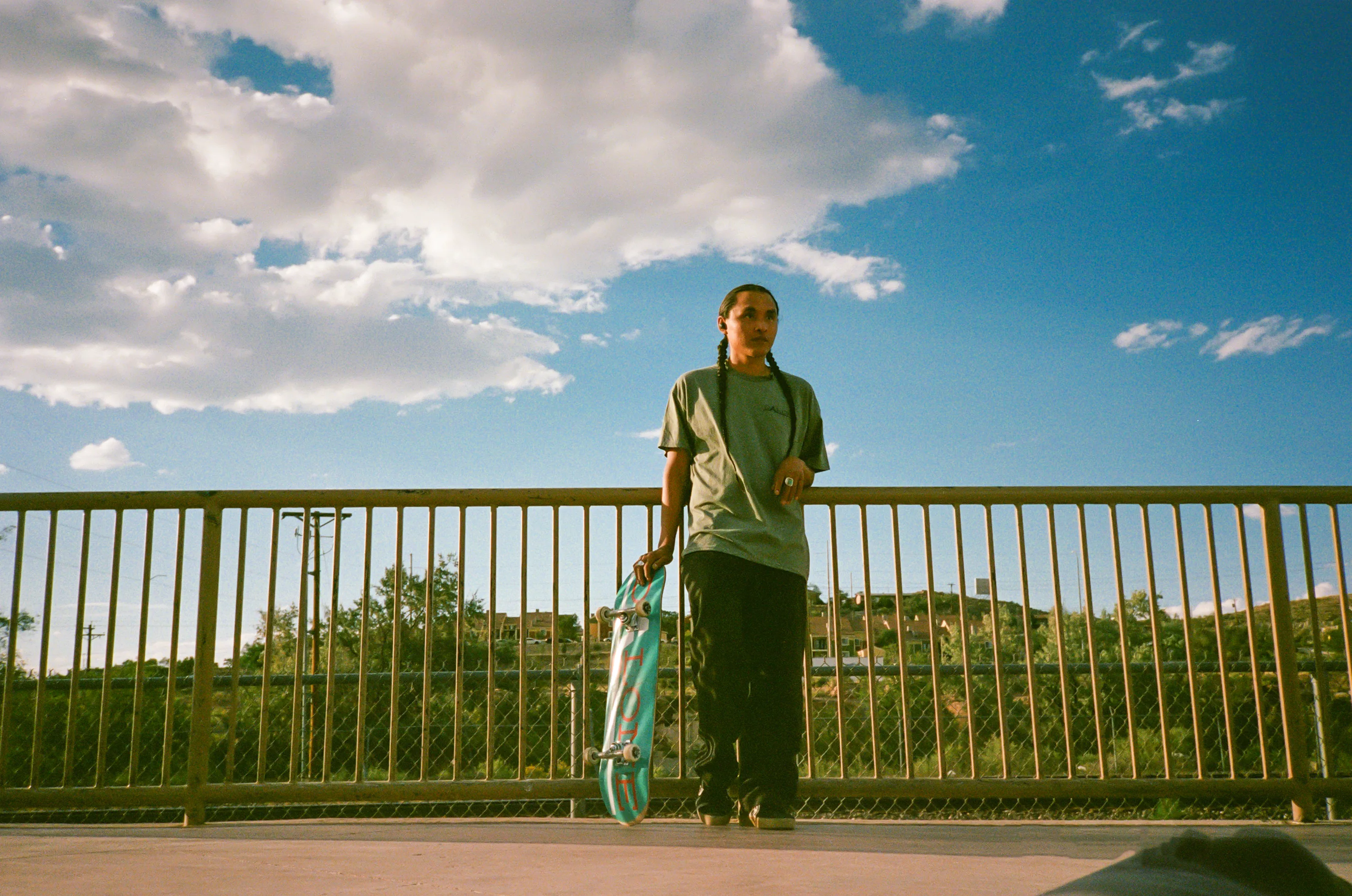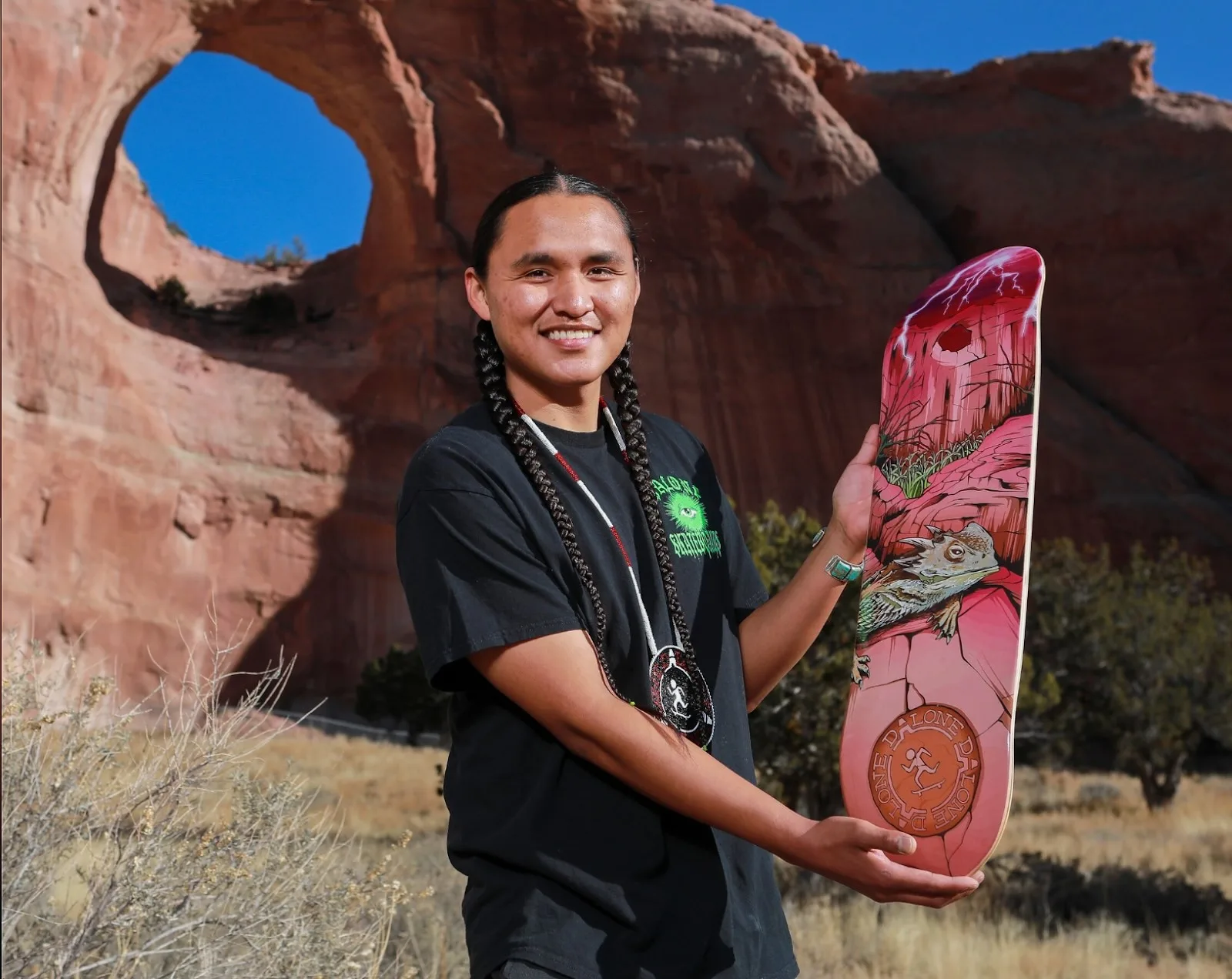Passion, culture, and community: how Dalone Skateboards is building a legacy
For Jerome Damon, owner of Dalone Skateboards, skateboarding is a form of catharsis. Jerome compares landing or failing to land tricks to the ups and downs of life, and he highlights the ways skateboarding ultimately allows you to be the most authentic version of yourself.
“When I’m learning a new trick, I get anxiety. I kind of get scared. I get shaky a little bit, so I try to make sure I can see myself doing it in my mind,” he said. “That’s when I go to the next step, to where I get that courage. The heart starts pumping when you get on the board. It’s like, this is it. There’s no turning back. I envisioned it. That’s the fun part—dreaming. Now it’s time to get to work.”
This same courage and conviction helped Jerome evolve his love for the sport into a business at the age of 21. Creating a range of skateboards that speak to his life, his heritage, and messages that often go unheard, Jerome focused on his company’s growth and impact—determined to make Dalone a global sensation.
Dalone Skateboards’ mission is “Dalone ‘til infinity,” or to have the legacy of the company live on for as long as possible. Beyond this, Jerome said Dalone represents being unapologetically yourself, standing up for what you believe in, and seeing others as equal.
‘I take pride in where I’m from’
Growing up in Gallup, New Mexico, the physical intersection of many different indigenous tribes and often referred to as the “heart of Native American ancestral homelands,” Jerome spent much of his early life surrounded by his Dine’ (Navajo) heritage, which has had a tremendous influence on his life and his work.
“It’s a small town, but some people actually don’t see the brighter side of Gallup,” Jerome said. “They always say, ‘Oh, it’s small, there’s not that many opportunities here. You can’t do this, you can’t do that.’ But if you actually look into the bigger picture and see Gallup and look around it—the areas, the reservations, McGaffey—all around it, you can actually appreciate where you’re from. I take pride [in] where I’m from, and I’m proud to be from Gallup.”
Growing up, Jerome questioned how to authentically represent himself, his Navajo heritage, and his interests in the world. Skateboarding proved to be just that outlet for him, allowing him to embrace the obstacles of life and find resilience through passion. “When I picked up a skateboard, that was the thing that broke me out of my shell,” he said. “I was shy and I kind of kept things to myself. I didn’t want to actually do something until I [saw] someone else do it. I never took the initiative to do things on my own.
“But deep down in your mind you know you can do it,” Jerome continued. “So that’s when all those emotions start coming [in] and you’re like, ‘You know what? I can do this.’ And you start switching the script around.”

Creating a product rooted in passion
Jerome is clear that the business followed passion, rather than the other way around. He relied entirely on the knowledge he had of skateboarding and creating boards to start the business, while also tapping into the people around him for their expertise and willingness to help support the business, particularly in its early days. Taking a loan from his grandparents and using his father’s photography skills, Jerome set up an online storefront for his first few decks.
Jerome explained that he didn’t grow up with many Native entrepreneurs to look to as inspiration, particularly since most people who grew up on the reservation, stayed on the reservation and often couldn’t afford to start their own business. Across the United States, less than 1% of businesses are indigenous-owned.
Starting a company was intimidating at first, but Jerome was determined to prove to himself that he could pursue a dream without the limitations of others’ expectations. His grandparents nicknamed him Dalone, and from that, Jerome created the first logo for his company. “With my company, I need to incorporate myself, Dalone. Dalone is me.”
In creating a logo that speaks to his heritage and his identity, Jerome also wanted to highlight the experience of skateboarding and being alone, signified by the enlarged ‘A’ in the middle of the word.
“The A stands out in Dalone Skateboards because it can be read as ‘alone,’” he said. “With skateboarding, you’re alone on the skateboard. With basically anything in life, you’re alone. No one can tell you who you are but yourself… so the concept behind Dalone is to actually embrace the loneliness of being you [and] just being yourself.”

By embracing that loneliness, Jerome ironically ended up finding community: Shortly after launching his online storefront, he began to sell boards to customers across the U.S., while steadily growing a social media following. He never anticipated the exponential growth that would follow, as he began receiving emails from customers from across the world, launched international shipping services, and built an international base of customers.
Incorporating heritage and tradition in every board
Since Dalone’s inception, Jerome’s top priority for the brand has been incorporating Navajo roots and traditions. He hopes to inspire others to also embrace and celebrate their own cultures. “My people have been through a lot—been through The Long Walk—and so much just for me to be here… I know who I am and where I come from, and I want to incorporate things about my traditions into these boards,” he said.
“I really hope that my boards inspire people to actually embrace their tradition, embrace where they are from, and to love who they are… to let them know that they can be themselves alone no matter what.”
For example, one of Dalone’s offerings—the Cheii skateboard—contains references to Dine’ myths of the horned toad who is said to have won in a fight against lightning.
“The significance of that board is just being protected by Cheii, and that Cheii is sending me his blessings and protecting me, saying, ‘I’m not going to let any bad thing or any bad omen or anything get to you, and I’m going to protect you while I’m here,’” Jerome said.

This isn’t the only time Jerome has used his business to raise awareness of Dine’ culture and the unique challenges Native people face. In 2021, Jerome created the “No More Stolen Sisters” skateboard to symbolize and contribute funds to the Missing and Murdered Indigenous Women (MMIW) movement. While it’s difficult to gauge exact numbers, the FBI’s National Crime Center reported 5,203 cases of missing Native women and girls in 2021. A 2016 study by the National Institute of Justice found that more than four in five American Indian and Alaska Native women (84.3%) experienced violence in their lifetime. Ultimately, there is a lack of awareness about the MMIW movement, and Jerome knows that he has an opportunity to bring more attention to it.
“With [the No More Stolen Sisters] board, when I skate and I look at it, it reminds me to be on a lookout for my sisters, and not just my sisters—my brothers and all my Native families—because there’s actually something that’s going on where people are getting kidnapped, they’re getting stolen, and they’re getting murdered, and that’s not right,” Jerome said.
Jerome explained that many instances of Native people going missing or being murdered are rarely reported on or paid attention to. Combined with poor record keeping and a lack of communication between various law enforcement groups, the inadequate investigative process to find missing Native people contributes to what are likely undercounts of the actual numbers.
Jerome said: “[I felt] like, I need to do something to help my people, so I made this MMIW board with [a woman] wearing the squash blossom and Native jewelry. I did this because I felt like I wanted to do this in my heart. I was like, ‘What could I do to help my people and give back? I have a business. I have things coming my way. What could I do to give back?’”
After Jerome shared videos of the MMIW board on social media, it sold out immediately. He donated all of the profits to five non-profit organizations that help Native families get clothing, water, food, baby formula, and other necessities.
While those moments were surreal, Jerome said recognition from his own community is the most special.
“It feels good to see the elders admire [my] work and how [I] incorporate [Dine’ culture]. They said: ‘Don’t forget. You [have] to remember [our] history because if you forget it, you can repeat it again.’ That’s why I try to put [our history] on the board—so we won’t forget, so it’ll always be there no matter what.”
Dalone ‘til infinity
Looking forward to the future, Jerome said his goal for Dalone Skateboards is to create a legacy that lasts forever. “I need Dalone to be everywhere. I want Dalone to be everywhere because it is everything. Dalone, like I said, Dalone is you. Dalone is what you put your mind to… Dalone until infinity,” he said.
Jerome hopes that by creating a brand that represents himself, he can inspire others to feel a part of something greater than themselves. For other Native business owners, he hopes that he can serve as inspiration that anything is possible.
“You hardly [ever] see Native American business owners, especially small business owners, and that’s what kind of [discourages] Native people [from starting their own businesses] because they don’t see their own people doing it. Having my own company, I want to inspire the little Native kids or even adults to know that you can still do something.”
Photos from Dalone Skateboards